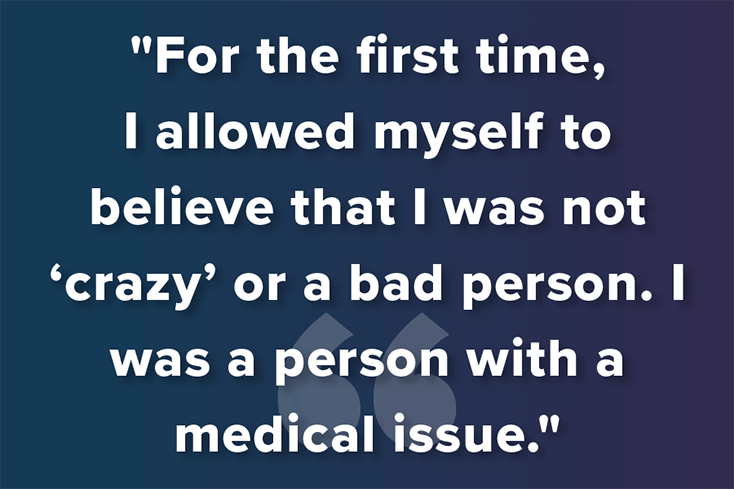April 06, 2023
By Lily Wells

Even though I come from a family with genetic predisposition to bipolar disorder, getting a proper diagnosis took years — too many years. We all knew my father and grandfather had it. My grandfather, a successful jeweler, died by suicide before I was born. My father, a renowned architect, had been hospitalized, given electroshock therapy and prescribed lithium. Despite their obvious strengths, their lives were clouded in shame. Bipolar disorder was a taboo — unspeakable — referred to as the “family curse.”
When my merry-go-round of highs and lows started at the age of 14, everyone dismissed it. My own family labeled me as “crazy.” I often felt like I was on a rollercoaster that I couldn’t get off. Up, up and up I’d go — everything moved fast, and my energy was high. Toward the top, I’d let go of the handlebars recklessly and wave my arms in exhilaration. Until the plunge. The downside was always an abrupt stop; the depth of despair was so intense I wanted to die. It kept happening, repeatedly.
I knew I had it, the family curse. Despite my family’s wealth, education and even familiarity with mental illness, no one wanted to admit it. My mental health condition was a reality my parents chose to ignore, hoping it wasn’t true or that it would go away on its own. It did not. I felt squeezed from the inside out. I’d hide under the covers, unclear if the monster was inside of me or all around me.
In college, I sought help through the university’s mental health clinic. There, a psychiatrist recommended therapy three days a week, convincing me it was the only way I’d get better. I went dutifully, three days a week, for three long years. This psychiatrist’s method was talk therapy, but I found that certain symptoms cannot be talked away. Like heart disease, cancer and diabetes, bipolar disorder is a medical condition. As a result, peering inward, trying to extract the thorn piercing my very being, was not effective on its own.
Eventually, my general physician diagnosed me with depression and prescribed antidepressants. Within a few weeks, I felt alive. I felt like I had been starving to live. I was more animated and was thinking and talking fast. I didn’t need much sleep. I felt great, so great that I decided I didn’t need the pills. I convinced myself they were a crutch and stopped taking them. Just as quickly as I had felt myself soaring, suddenly everything was dark. Shadows got bigger and darker. A familiar pattern reemerged, waking up in a startle, hands sweaty, head hurting and heart racing. Except this time was worse. Getting out of the bed felt like a near-impossible task.
Finally, I went to a doctor specializing in mental illness. I had all the symptoms of bipolar 1 disorder. Along with my heredity, the doctor explained that my experience with the antidepressant confirmed it. Since the antidepressant only addressed the depressive side, it ended up triggering the mania. When I stopped taking the pills, the depressive side emerged.
After I was properly diagnosed with bipolar 1 disorder and prescribed lithium and antidepressants, I began to feel better. I felt less disassociated from my body. The condemning voices were quieting. I stopped spontaneously breaking into tears and decisions were easier to make. Despite the many side effects of lithium, it was a welcome stabilizer. I began to feel what I imagine “normal” to be like, and I realized that all those years, my body had been at war with itself. For the first time, I allowed myself to believe that I was not “crazy” or a bad person. I was a person with a medical issue.
Tragically, my family’s belief that our medical condition was a “curse” continued. My father and uncle were considered geniuses, and their opportunities to share their talents with the world were cut short when they both died by suicide. The stigma associated with mental illness prevented them from getting medical treatment. Today, I’m blessed that medication, plus love and forgiveness, has given me a life worth living. I’ve been happily married for 30 years, have three healthy children and have a thriving professional career.
We’re always accepting submissions to the NAMI Blog! We feature the latest research, stories of recovery, ways to end stigma and strategies for living well with mental illness. Most importantly: We feature your voices.
LEARN MORENAMI HelpLine is available M-F, 10 a.m. – 10 p.m. ET. Call 800-950-6264,
text “NAMI” to 62640, or email. In a crisis, call or text 988 (24/7).